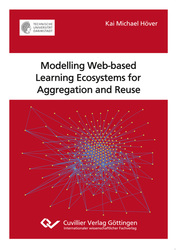| Areas | |
|---|---|
| Serie de libros (96) |
1381
|
| Nachhaltigkeit |
3
|
| Gesundheitswesen |
1
|
| Letra |
2370
|
| Ciencias Naturales |
5408
|
| Matemática | 229 |
| Informática | 319 |
| Física | 980 |
| Química | 1364 |
| Geociencias | 131 |
| Medicina humana | 243 |
| Estomatología | 10 |
| Veterinaria | 108 |
| Farmacia | 147 |
| Biología | 835 |
| Bioquímica, biología molecular, tecnología genética | 121 |
| Biofísica | 25 |
| Nutrición | 45 |
| Agricultura | 1005 |
| Silvicultura | 201 |
| Horticultura | 20 |
| Ecología y conservación de la tierra | 148 |
| Ciencias Ingeniería |
1795
|
| General |
98
|
|
Leitlinien Unfallchirurgie
5. Auflage bestellen |
|
Erweiterte Suche
Modelling Web-based Learning Ecosystems for Aggregation and Reuse (Tienda española)
Kai Michael Höver (Autor)Previo
Indice, PDF (52 KB)
Lectura de prueba, PDF (600 KB)
In der E-Learning-Domäne bilden sowohl die Lernressourcen, Lehrende und Lernende als auch die stattfindenden Lernprozesse in ihrer Gesamtheit Lernökosysteme. Diese Dissertation untersucht die Modellierung von Lernökosystemen zur Unterstützung ihrer Aggregation und Wiederverwendung. Zur Erreichung dieses Ziels müssen Modelle von Lernökosystemen die Aggregierbarkeit, Austauschbarkeit, Interoperabilität und granulare Wiederverwendbarkeit ihrer Daten unterstützen. Auf Basis durchgeführter Nutzerstudien werden Konzepte digitaler Modelle von Lernökosystemen, sogenannte LOOCs (Linked Open Online Courses), entwickelt. Dabei werden insbesondere Technologien des Semantic Webs sowie Linked-Data-Konzepte betrachtet. Die entwickelten ontologischen Modelle bilden die Basis für mehrere E-Learning-Applikationen, welche die Tragfähigkeit der Konzepte sowie eine hohe Nutzerakzeptanz zeigen. Ferner wird ein formales Interpretermodell für CSCL (Computer-Supported Collaborative Learning) Scripts zur Beschreibung von Lernprozessen, welches mit Hilfe von Abstract State Machines spezifiziert wurde, vorgestellt.
In the e-learning domain, the learning resources, teachers and learners and the active learning processes in their entirety construct the learning ecosystems. This thesis examines the modelling of learning ecosystems to support their aggregation and reuse. To achieve this goal, learning ecosystem models must support aggregation, compatibility, interoperability and granular re-usability of their data. Through user studies, digital model concepts of learning ecosystems, i.e. so-called LOOCs (linked open online courses), were developed. In particular, Semantic Web technologies and Linked Data concepts are considered within the context. The developed ontological models form the basis for a number of e-learning applications that show the viability of the concepts as well as a high user acceptance. Further, a formal interpreter model for CSCL (Computer-Supported Collaborative Learning) Scripts for the description of learning processes specified by using Abstract State Machines is presented.
| ISBN-13 (Impresion) | 9783954049899 |
| ISBN-13 (E-Book) | 9783736949898 |
| Formato | B5 |
| Idioma | Inglés |
| Numero de paginas | 292 |
| Laminacion de la cubierta | Brillante |
| Edicion | 1. Aufl. |
| Lugar de publicacion | Göttingen |
| Lugar de la disertacion | Darmstadt |
| Fecha de publicacion | 28.04.2015 |
| Clasificacion simple | Tesis doctoral |
| Area |
Informática
|
| Palabras claves | E-Learning, Learning Ecosystems, Reuse, Lecture Recordings, Linked Open Online Courses, SCSL Scripts, Linked Data, Ontologies |








